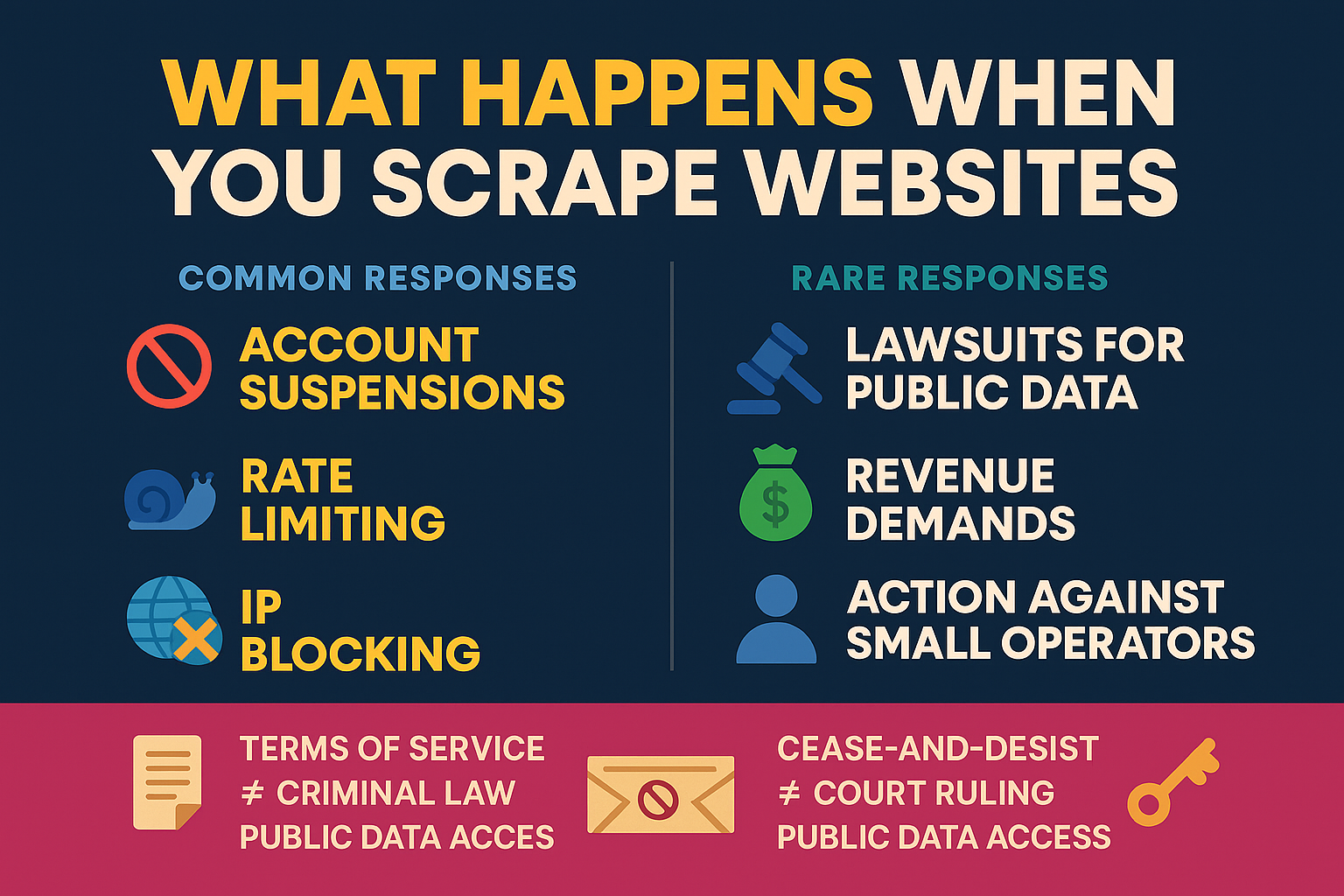So you've decided to scrape social media data. You know it's legal (based on recent court rulings), but what actually happens when these platforms catch you in the act?
Having seen countless scraping operations over the years, I can tell you that each platform has its own playbook for dealing with scrapers.
Here's the real-world breakdown of what to expect:
Meta (Facebook & Instagram): The Legal Intimidation Masters
What They'll Do:
- Send you really intimidating cease-and-desist letters (probably 2 or more)
- Demand you hand over your scraping code and any money you've made from the project
- Delete your Instagram and Facebook accounts immediately
- Threaten legal action with scary lawyer language
Reality Check: Just ignore them and you'll be fine.
Meta loves to flex their legal muscles, but as we've seen in recent court cases like Bright Data vs. Meta, they consistently lose when it comes to public data scraping. Their C&D letters are designed to scare you into compliance, not because they have strong legal grounds.
Pro Tip: Don't respond to their demands for your code or revenue. You're under no legal obligation to comply with these requests for public data scraping.
Twitter/X: The Selective Enforcers
What They'll Do:
- Only send cease-and-desist letters if you're scraping behind the login wall
- Delete your Twitter account (this one they actually follow through on)
- Generally leave you alone if you stick to public tweets
The Strategy: Twitter has learned from the court losses. They focus their legal threats on scrapers who are accessing private or authenticated data, where they actually have legal standing.
Bottom Line: Stay in the public timeline and you're mostly safe from legal action, though your account might still get the axe.
YouTube: The Hypocritical Giant
What They'll Do: Basically nothing.
Why: Google literally scrapes the entire internet for their search engine. It would be pretty hypocritical for them to come after you for scraping their publicly available video data.
The Exception: They do care about downloading actual video files or circumventing their monetization systems, but public metadata scraping? They've got bigger fish to fry.
TikTok: The Wild Card
What They'll Do: Varies widely, but enforcement is inconsistent.
The Reality: TikTok's enforcement seems less systematic than other platforms. Their legal team appears more focused on national security concerns and government relations than individual scrapers.
Cultural Note: Different legal frameworks and enforcement priorities mean their response patterns are less predictable than US-based platforms.
General Patterns Across All Platforms
What Every Platform Will Do:
- Account Suspension: This is universal. If they detect scraping from your account, it's getting banned.
- Rate Limiting: Expect your requests to get throttled or blocked entirely.
- IP Blocking: Persistent scraping often leads to IP-based blocks.
What Most Won't Do:
- Actually Sue You: Despite the threats, lawsuits for public data scraping are rare and expensive.
- Pursue Small Operators: Legal action is typically reserved for large-scale commercial operations.
- Follow Through on Revenue Demands: These are scare tactics without legal backing for public data.
The Legal Reality vs. Platform Policies
Here's the key distinction: platform terms of service violations are not criminal acts. Courts have repeatedly ruled that simply violating a website's terms of service doesn't constitute illegal activity under laws like the Computer Fraud and Abuse Act.
What this means:
- Getting banned from a platform ≠ breaking the law
- Cease-and-desist letters ≠ valid legal claims
- Terms of service violations ≠ criminal activity
How to Minimize Platform Retaliation
Best Practices:
- Use Residential Proxies: Rotate IP addresses to avoid detection
- Respect Rate Limits: Don't hammer their servers
- Scrape Public Data Only: Stay away from anything behind login walls
- Use Throwaway Accounts: Assume any accounts you use will get banned
- Don't Respond to C&D Letters: Engaging often escalates the situation
Red Flags That Increase Enforcement:
- Creating fake accounts for scraping
- Accessing private/authenticated data
- Overwhelming their servers with requests
- Commercial use that directly competes with their business model
- Public announcements about your scraping activities
The Bottom Line
Most social media platforms bark louder than they bite when it comes to public data scraping. They rely heavily on intimidation tactics because their actual legal standing is weak for publicly accessible data.
The Pattern: Account bans are certain, legal action is rare, and court precedent is on your side for public data.
The Strategy: Build your scraping infrastructure assuming accounts will get banned, use proper technical measures to avoid detection, and don't let scary lawyer letters deter you from legally permissible activities.
Remember: there's a big difference between what platforms want you to think is illegal and what's actually illegal under current law.

